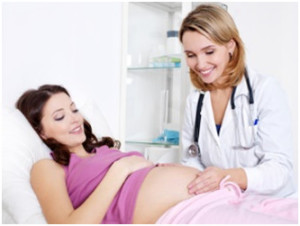Will A Multivitamin A Day Keep YourBaby Healthy?
Author: Dr. Stephen Chaney
 The standard medical advice for years has been to take a prenatal supplement (basically a multivitamin with extra folic acid, iron and sometimes calcium) both before and during pregnancy. Does that really make a difference? Will it reduce the risk of miscarriage? Will it give you a healthier baby? A recent study suggests that multivitamin use may significantly decrease your risk of miscarrying, but before going into the study you need a little background.
The standard medical advice for years has been to take a prenatal supplement (basically a multivitamin with extra folic acid, iron and sometimes calcium) both before and during pregnancy. Does that really make a difference? Will it reduce the risk of miscarriage? Will it give you a healthier baby? A recent study suggests that multivitamin use may significantly decrease your risk of miscarrying, but before going into the study you need a little background.
It’s a new world. It used to be that a woman didn’t know for sure that she was pregnant until she had missed one or two periods and finally got an appointment with her doctor – a month or two after conception actually occurred. In today’s world accuracy in home pregnancy tests allow women to learn they are pregnant much earlier – often before the first missed period.
With the early detection of pregnancy has come the realization that miscarriage rates are much higher than previously assumed. In spite of improved prenatal care, the rate of miscarriages in the US increased by 1% per year between 1985 and 2005. In part that is because women using the in-home pregnancy tests are detecting their pregnancies much early. However, it also reflects the fact that early miscarriages are often asymptomatic. They can only be detected by negative pregnancy tests.
With that in mind, let’s look at the study.
Do Multivitamins Reduce the Risk of Miscarriage?
 This study (Louis et al, Fertility and Sterility, doi.org.10.1016/j.fertnstert.2016.03.009, 2016), had a very interesting design. It enrolled 501 couples ages 18-40 from Michigan and Texas who were actively trying to become pregnant into something called the Longitudinal Investigation of Fertility and the Environment (LIFE) Study. The women in the study were instructed in the use of a commercial fertility urine test to help the couples plan their intercourse to maximize the chances of conceiving. They were also instructed in the use of a commercial pregnancy urine test to determine the onset and potential loss of pregnancy (miscarriage).
This study (Louis et al, Fertility and Sterility, doi.org.10.1016/j.fertnstert.2016.03.009, 2016), had a very interesting design. It enrolled 501 couples ages 18-40 from Michigan and Texas who were actively trying to become pregnant into something called the Longitudinal Investigation of Fertility and the Environment (LIFE) Study. The women in the study were instructed in the use of a commercial fertility urine test to help the couples plan their intercourse to maximize the chances of conceiving. They were also instructed in the use of a commercial pregnancy urine test to determine the onset and potential loss of pregnancy (miscarriage).
The couples were given no guidance on health practices to follow before and during pregnancy. They were interviewed individually upon enrolment to obtain sociodemographic, lifestyle, and medical history information. They were asked to keep a daily journal recording things like cigarettes use, consumption of alcoholic or caffeinated beverages, and multivitamin use (The journal did not distinguish between over-the-counter multivitamins and prescribed prenatal vitamins).
Of the couples who enrolled in the study, 347 (69%) of them became pregnant. Three of the women conceived twins and were eliminated from the study. Of the remaining 344 women, 98 (28%) of them experienced a miscarriage during the first 22 weeks. No miscarriages were observed after 22 weeks.
When they looked at risk factors that affected pregnancy loss (miscarriages):
- The miscarriage rate was almost double for women over 35, which is consistent with previous studies.
- Consumption of two or more caffeinated beverages/day by either partner prior to conception and during early pregnancy significantly increased the risk of miscarriage
- Daily multivitamin use by the woman prior to conception reduced the risk of miscarriage by 55%. If the vitamin use was continued through the first 7 weeks of pregnancy, the risk of miscarriage was reduced by 79%.
- No effect of obesity, cigarette smoking, and alcohol use on miscarriage risk was seen in this study, which is different from most previous studies.
Putting This Study Into Perspective
This was a fairly well designed study, but it is a single study. Let’s put each of the main findings in the context of previous studies.
Multivitamin Use: Earlier studies have shown that supplements containing extra folic acid probably reduce miscarriages. However, now that foods are routinely fortified with folic acid in the US, the benefit of multivitamins and prenatal supplements has become more controversial. Some studies have shown, like this one, that multivitamins reduce miscarriage risk. Others did not. However, multivitamin use before and during pregnancy has relatively few risks, so it is still probably a good idea.
Caffeinated Beverages: There have been relatively few studies to date on the effect of caffeinated beverages on miscarriage risk, but the few that have been performed tend to agree that caffeinated beverages may increase the risk of miscarriage. While the data are far from definitive at this point, it is probably a good idea to limit your caffeinated beverages before and during pregnancy.
Age: Age is a well-established risk factor for miscarriages. While many consider 40 as the threshold for increased risk, this study and several other recent studies suggest it may be closer to 35. That doesn’t mean that you shouldn’t try to have a baby if you are over 35, but it does mean that you will probably want to avoid any lifestyle factors that might increase your risk of miscarriage.
Other Factors:This study did not find an effect of obesity, smoking or alcohol on pregnancy risk. However, many other studies have shown that each of these increases the risk of miscarriage. It’s probably a good idea to drop a few extra pounds and avoid both smoking and alcohol if you wish to maximize your chances of a successful pregnancy outcome.
If You Are Pregnant, What Does This Study Mean For You?
 This study supports multivitamin use before and during pregnancy and suggests that excessive consumption of caffeinated beverages may have a negative effect on pregnancy outcome. However, it doesn’t significantly alter the standard medical advice for what you should do before and during pregnancy.
This study supports multivitamin use before and during pregnancy and suggests that excessive consumption of caffeinated beverages may have a negative effect on pregnancy outcome. However, it doesn’t significantly alter the standard medical advice for what you should do before and during pregnancy.
- Daily multivitamin use, both prior to and during pregnancy, is probably a good idea. Not all studies agree, but some studies suggest that it will significantly decrease the risk of miscarriage.
- Obesity and diabetes increase miscarriage risk. The good news is that even a 5-10% weight loss often is sufficient to reverse diabetes and may improve pregnancy outcome as well.
- If you are over 35, your risk of suffering a miscarriage is significantly increased.
- Smoking and alcohol use should be avoided. Both are likely to increase your risk of miscarriage.
- Recent studies suggest that the consumption of two or more caffeinated beverages a day may also increase your risk of miscarriage, so don’t overindulge in caffeinated beverages. Be aware that it’s not just coffee and tea that are caffeinated. Many sodas are caffeinated as well.
The Bottom Line
A recent study showed:
- Daily multivitamin use by the woman prior to conception reduced the risk of miscarriage by 55%. If the vitamin use was continued through the first 7 weeks of pregnancy, the risk of miscarriage was reduced by 79%.
- Consumption of two or more caffeinated beverages/day by either partner prior to conception and during early pregnancy significantly increased the risk of miscarriage
- The miscarriage rate was almost double for women over 35, which is consistent with previous studies.
- No effect of obesity, cigarette smoking, and alcohol use on miscarriage risk was seen in this study, which is different from most previous studies.
- This study reinforces the recommendation for multivitamin or prenatal vitamin use, but the standard medical advice for a successful pregnancy isn’t really changed:
- Daily multivitamin use, both prior to and during pregnancy, is probably a good idea. Not all studies agree, but some studies suggest that it will significantly decrease the risk of miscarriage.
- Obesity and diabetes increase miscarriage risk. The good news is that even a 5-10% weight loss often is sufficient to reverse diabetes and may improve pregnancy outcome as well.
- If you are over 35, your risk of suffering a miscarriage is significantly increased. That doesn’t mean that you shouldn’t try to have a baby if you are over 35, but it does mean that you will probably want to avoid any lifestyle factors that might increase your risk of miscarriage.
- Smoking and alcohol use should be avoided. Both are likely to increase your risk of miscarriage.
- Recent studies suggest that the consumption of two or more caffeinated beverages a day may also increase your risk of miscarriage, so don’t overindulge in caffeinated beverages. Be aware that it’s not just coffee and tea that are caffeinated. Many sodas are caffeinated as well.
These statements have not been evaluated by the Food and Drug Administration. This information is not intended to diagnose, treat, cure or prevent any disease.
